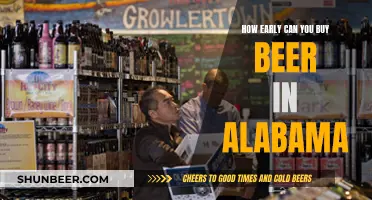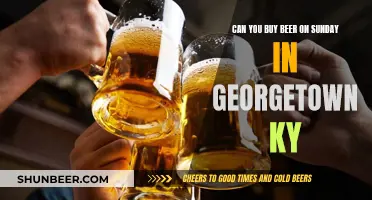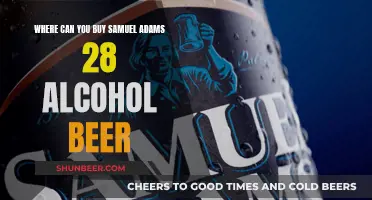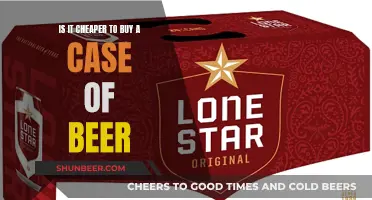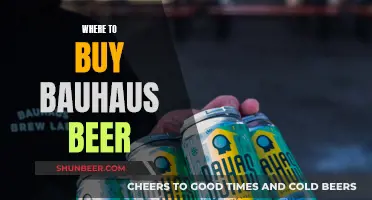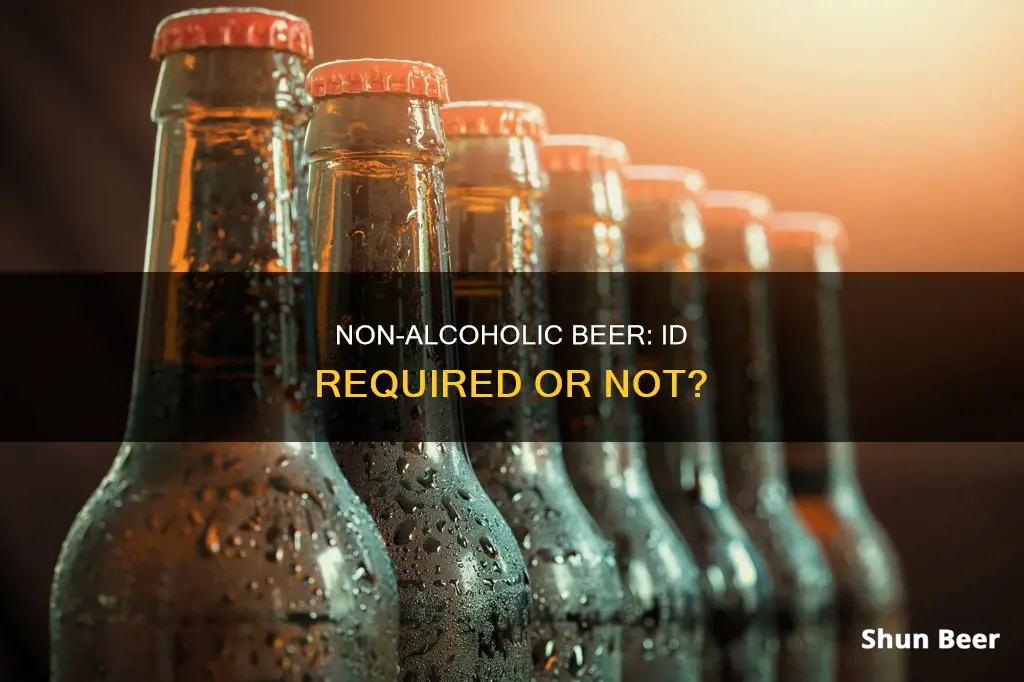
Non-alcoholic beer has become increasingly popular, with a growing market size since 2018. Despite the name, non-alcoholic beer is still regulated by the Federal Alcohol Administration (FAA) Act, which covers all malt beverages irrespective of alcohol content. This means that non-alcoholic beer still falls under the generic beer umbrella. While the laws vary from state to state, in many states, minors cannot purchase alcohol but may consume it under certain conditions, such as with the supervision of a parent or guardian. The laws surrounding the purchase of non-alcoholic beer by minors are complex and depend on individual state regulations and retailer policies.
| Characteristics | Values |
|---|---|
| Need for ID to buy non-alcoholic beer | Varies by state/country and retailer |
| Reasons for ID requirement | To avoid promoting alcohol to children; to make it easier to enforce rules regarding alcoholic drinks |
| Non-alcoholic defined | Up to 0.5% ABV |
| Alcohol-free defined | 0.0% ABV |
What You'll Learn
- Non-alcoholic beer is regulated by the Federal Alcohol Administration Act
- It usually contains up to 0.5% ABV
- It's treated like alcoholic beer to avoid promoting alcohol to children
- It's easier to enforce rules regarding alcoholic drinks
- Some states have different rules about buying non-alcoholic beer under 21

Non-alcoholic beer is regulated by the Federal Alcohol Administration Act
In many places, non-alcoholic drinks are treated the same as alcoholic drinks by pubs, bars, and shops. This means that non-alcoholic drinks are often subject to the same restrictions as alcoholic drinks, and people may be asked to show ID to buy them. However, this is not due to a legal requirement, but rather a choice made by retailers. In most regions, including the UK and many US states, drinks under 0.5% ABV aren't legally considered "alcohol" and aren't subject to the same restrictions as drinks with higher ABV.
The FAA Act regulates malt beverages, regardless of their alcohol content, if they meet the Act's requirements of containing some malted barley, some hops (or hop parts or products), and having been subject to fermentation. This means that non-alcoholic and alcohol-free beers, which are produced like conventional beer and then de-alcoholized, fall under the TTB's labeling and advertising jurisdiction. This includes specific regulations for these products, such as requiring a formula to be submitted and approved by the TTB before production. Additionally, the FAA Act's definition of "malt beverage" does not include any minimum or maximum threshold of alcohol content, further supporting the regulation of non-alcoholic beers.
The FAA Act also includes provisions to preclude unfair trade practices, such as regulating marketing promotional practices concerning the sale of alcohol beverages and practices like exclusive outlets, tied house arrangements, commercial bribery, and consignment sales. These provisions help to ensure a fair and transparent market for alcohol beverages, including non-alcoholic beers.
Buying Beer at Michigan Stadium: What's the Deal?
You may want to see also

It usually contains up to 0.5% ABV
Non-alcoholic beer is a beverage that contains very little to no alcohol. In the United States, non-alcoholic beers can contain up to 0.5% alcohol by volume (ABV). This means that non-alcoholic beers typically fall into the range of having between 0.0% and 0.5% ABV.
Beers with an ABV of 0.5% or lower are considered non-alcoholic in many parts of the world. In the United States, beverages containing less than 0.5% ABV were once legally defined as non-alcoholic, according to the now-defunct Volstead Act. In the United Kingdom, government guidance recommends that drinks with no more than 0.05% ABV be labelled as "no alcohol" or "alcohol-free", while those with an ABV between 0.05% and 0.5% ABV be labelled as "dealcoholized". In some parts of the European Union, a drink must not have more than 0.5% ABV to be labelled "alcohol-free".
While non-alcoholic beers typically have an ABV of up to 0.5%, it is important to note that the actual alcohol content may vary depending on the brand and the production method used. Some non-alcoholic beers may contain higher or lower amounts of alcohol than advertised. Therefore, it is always a good idea to check the label and do your research before consuming non-alcoholic beers, especially if you are avoiding alcohol altogether.
In terms of consumption, the requirement to show ID when purchasing non-alcoholic beer varies depending on local laws and retailer policies. In most regions, including the UK and many US states, drinks under 0.5% ABV are not legally considered alcoholic and are not subject to the same restrictions as higher-ABV beverages. However, some retailers and establishments may still choose to restrict the sale of non-alcoholic beers to minors to avoid promoting alcohol to children and to facilitate easier enforcement of rules regarding alcoholic drinks.
Best Places to Buy Hill Farmstead Beer
You may want to see also

It's treated like alcoholic beer to avoid promoting alcohol to children
In many places, non-alcoholic beer is treated like alcoholic beer, meaning that only those who can prove they are above the legal drinking age can purchase it. This is done primarily to avoid promoting alcohol to children.
Non-alcoholic beer, despite the name, is not entirely free of alcohol. In fact, most non-alcoholic beers contain up to 0.5% alcohol by volume (ABV). This means that, when consumed in large quantities, there is a chance that the drinker may feel some effects of the alcohol. While this is perfectly safe for adults, it could be dangerous for children.
Additionally, the packaging and appearance of non-alcoholic beer are almost indistinguishable from alcoholic beer. If children were allowed to buy non-alcoholic beer, it could indirectly promote alcoholic beer to them. Many non-alcoholic beers are produced by companies that also produce alcoholic drinks, so by allowing the sale of non-alcoholic beer to minors, companies could be seen as promoting similar alcoholic products to underage consumers.
Retailers and pubs that sell non-alcoholic beer to adults only are therefore taking a responsible approach to avoid promoting alcohol to minors. This is a voluntary restriction, as in most regions, drinks under 0.5% ABV are not legally considered "alcohol" and are not subject to the same restrictions as alcoholic drinks.
Some states in the US have specific laws regarding the sale of non-alcoholic beer to minors. For example, in Ohio, individuals must be over 18 to purchase non-alcoholic beer, while Oregon, West Virginia, and Wyoming only allow the sale of non-alcoholic beer to those over 21 if it contains at least 0.5% ABV.
Memorial Day Beer Run in Massachusetts: What's the Deal?
You may want to see also

It's easier to enforce rules regarding alcoholic drinks
In many countries, the legal definition of an alcoholic beverage is one that contains more than 0.5% ABV (alcohol by volume). However, non-alcoholic beer does contain some alcohol, ranging from trace amounts to around 0.5% ABV. Despite this, in most regions, including the UK and many US states, drinks under 0.5% ABV aren't legally considered alcoholic and aren't subject to the same restrictions as alcoholic drinks.
Nevertheless, pubs, bars, and retailers often choose to treat non-alcoholic beer the same as alcoholic beer. One of the main reasons for this is to make it easier to enforce rules regarding alcoholic drinks. Here are some reasons why it's easier to enforce rules when non-alcoholic drinks are treated the same as alcoholic ones:
Similar Packaging
The packaging of non-alcoholic beer is almost identical to that of regular beer. In pubs and bars, it can be difficult for staff to distinguish between customers drinking alcoholic and non-alcoholic products. Treating them the same makes monitoring customers' drinks simpler for staff.
Preventing Minors' Access
Non-alcoholic beer is often produced by companies that also make alcoholic drinks. By restricting the sale of non-alcoholic beer, retailers can avoid indirectly promoting alcoholic products to minors. The packaging and branding of non-alcoholic beer are very similar to those of alcoholic beer, so allowing minors to buy non-alcoholic beer could encourage them to seek out similar products that contain alcohol.
Reducing Confusion
Treating non-alcoholic drinks as alcoholic ones helps to reduce confusion among customers, particularly those who are underage. If minors are allowed to purchase non-alcoholic beer, they may not understand the difference between that and regular beer, potentially leading to accidental sales of alcoholic drinks to underage customers.
Compliance with Licensing Rules
In some places, there are restrictions on the days and hours during which alcohol can be sold. By treating non-alcoholic drinks as alcoholic ones, retailers can more easily comply with these licensing rules without having to worry about accidentally selling age-restricted products outside of permitted hours.
Maintaining a Consistent Policy
Pubs, bars, and retailers may find it simpler to have a blanket policy of only selling alcoholic and non-alcoholic drinks to customers who are of legal drinking age. This avoids any potential confusion or mistakes that could arise from having different policies for different types of drinks.
Best Places to Buy 1919 Root Beer
You may want to see also

Some states have different rules about buying non-alcoholic beer under 21
In the United States, a non-alcoholic beer is defined as containing less than 0.5% alcohol by volume (ABV). While this is significantly less than traditional beer, which typically ranges from 4-6% ABV, non-alcoholic beer is not entirely alcohol-free.
The laws surrounding the purchase of non-alcoholic beverages by minors vary across different states. While each state has set the legal drinking age to 21, they have different definitions of what constitutes an alcoholic beverage. This means that some states have different rules about buying non-alcoholic beer if you are under 21.
For example, in Ohio, you must be over 18 to buy non-alcoholic beer. In Oregon, West Virginia, and Wyoming, on the other hand, you cannot purchase non-alcoholic beer if you are under 21. In Alabama, the law is even more complex, as it is not regulated in wet counties, but the sale of non-alcoholic beer to minors is prohibited in dry counties.
Some states allow minors to purchase non-alcoholic beer with parental permission or in the presence of a parent or legal guardian. These states include Alabama, Louisiana, Mississippi, New Mexico, North Carolina, North Dakota, Oregon, West Virginia, and Wyoming.
Retail stores and online retailers often require customers to be at least 21 years old to avoid falling victim to any legal loopholes and to prevent the risk of fines, loss of alcohol licenses, or imprisonment if found guilty of selling alcoholic drinks to underage persons.
Buying Beer in Florence, SC: Sunday Shopping Laws
You may want to see also
Frequently asked questions
It depends on where you are. In the US, the National Minimum Drinking Age Act forbids the sale of beverages containing alcohol to buyers under 21. However, individual states have their own laws on the purchase of non-alcoholic drinks. For example, Ohio requires buyers to be over 18, while Oregon, West Virginia, and Wyoming only allow the purchase of non-alcoholic drinks containing less than 0.5% ABV to those over 21.
Non-alcoholic beers are still regulated by the Federal Alcohol Administration Act, as the FAA regulates all malt beverages irrespective of alcohol content. Additionally, retailers may restrict the sale of non-alcoholic beer to avoid promoting alcohol to minors and to make it easier to enforce rules regarding alcoholic drinks.
In the US, states where buyers under the age of 21 are allowed to purchase non-alcoholic beer include the District of Columbia, Alabama, Louisiana, Mississippi, New Mexico, North Carolina, North Dakota, Ohio, Oklahoma, Oregon, West Virginia, and Wyoming. However, it's important to note that laws can vary within a state, and some retailers may have their own policies requiring customers to be at least 21.


